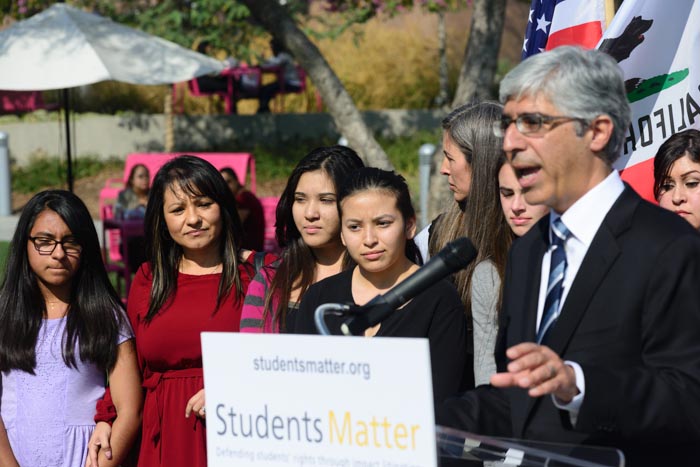Vergara vs. California: LAUSD Superintendent Deasy Testifies Against Hiring and Termination Statutes

Los Angeles Unified School District Superintendent Dr. John Deasy testified against the current hiring and termination statutes in thehighly anticipated Vergara vs. California case, saying that administrators are not given enough time or enough data to properly make decisions relating to tenure employment.
Deasy outlined the process for evaluating teachers in their first two years of employment, and explained that administrators have to evaluate both competence as a teacher and evidence of growth and potential within a period of 13 months. According to Deasy, tenure decisions are made in January of a teacher's second year and approved in February.
"In the very best of circumstances, we have one year of data from the pupils with which the teachers worked with," Deasy said. "There is no way this is a sufficient amount of time to make, in my opinion, an incredibly important judgment."
He also said that "in a very bizarre twist in California," tenure decisions are made before teachers move completely through the support system that is in place to help new teachers improve.
Deasy's testimony is an essential component to the plaintiff's argument that California's process of awarding teachers tenure-effectively guaranteeing employment for the rest of their lives-increases the chances of allowing ineffective teachers to become permanent fixtures in California classrooms.
The testimony then moved to the laws that lay out the process for firing a tenured teacher, which Deasy claimed was extremely lengthy--one case took nearly ten years--and expensive, both economically (the average cost per case is between $250,000 and $450,000) and in relation to what he called "human capital."
"It is documented that principals need days and days away from the district in preparation for a dismissal hearing or days like today where they have to testify," Deasy said. "There are interviews I've conducted with principals and administrators that talk about personal and professional difficulty in moving through this process and in more than one occasion with a principal that would think twice before going through this process again."
The nine plaintiffs ranging in both age and geographic location were in attendance, and some spoke at a press conference during the lunch break.
Holding a copy of "Dracula" in her hand, eighth grader Julia Macias described why she is fighting to change the hiring and termination statutes in California that she and nine other students say are potentially harmful to students in public schools across the state.
"I believe that kids deserve a good education," she said. "In elementary school I had quite a few bad teachers. They lowered my test scores and they lowered my self-esteem as well."
Opening statements for the Vergara vs. California case began with the plaintiff outlining their argument against the state's current system of tenure and its long, costly process of terminating ineffective educators.
Lead attorney Ted Boutrous broke the case into three areas of interest: the "last in, first out" (LIFO), the permanent employment and dismissal statutes.
"The system forces administrators to put people that everyone would agree should not be in the classrooms, and that hurts kids every single day," Boutrous said at the press conference following the morning session.
According to the plaintiff, the statutes don't give enough time for administrators to fully evaluate teachers before offering permanent employment, and that the system makes it nearly impossible to fire teachers in the bottom five percent of effectiveness evaluations. Additionally, the LIFO statute mandates that layoffs be done according to seniority, not teacher effectiveness.
All of these problems are reasons why the plaintiffs believe the current statues go against the constitutional rights of California citizens to a quality education.
For example, Boutrous said, one teacher was recently laid off despite earning Teacher of the Year solely because she had been teaching the fewest amounts of years. Even if a school wanted to terminate a teacher based on employment (a rare occurrence, according to the plaintiff), it would take years and cost the state thousands, if not hundreds of thousands of dollars.
In other words, an older ineffective teacher does not have to worry about losing his job, and even if administrators want to fire him they probably won't because the process is too arduous and costly.
The defense argued in their statements that the statutes in question shouldn't be judged on their constitutionality, but instead be dealt with in the legislative branch.
The California Teachers Association and the California Federation of Teachers say that attacking these statutes infringes on the rights of teachers, wastes taxpayer money and ultimately not help students. Should the statutes be changed, they believe that the due process rights of teachers will be violated. Additionally, they say such changes would make it harder to find and keep quality teachers in the state.
Deasy’s testimony will continue tomorrow beginning at 9:30 a.m.



